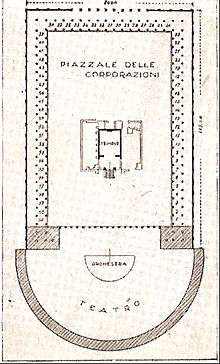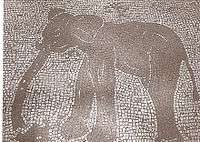Piazzale delle Corporazioni
The Forum of Corporations, or the Piazzale delle Corporazioni, was the principal center of commerce and trade for the Roman Empire mainly during the Age of Augustus. Located in the major port city of Ostia, this open-air market was essential for Rome as a place of varying and exotic goods from foreign lands. Merchants gathered here to sell anything from grain and shipping services to elephants and giraffes.

.jpg)
Rebuilt in the 2nd century AD, The Forum of Corporations was also representative of the many diverse cultures that made up the Roman Empire. Oil importers, grain importers, rope-makers, and ship builders from corporations spanning across the empire came here to benefit from Ostia’s positioning at the mouth of the Tiber River which easily facilitated the importation and transportation of goods into the empire.
Structure
The forum was enclosed by a wall made of brick surfaced with stucco and measured 100 meters by 80 meters. A total of 61 rooms, each which was 4 meters by 4 meters, opened up to the forum. The rooms were separated by a wooden partition and were arranged based on geographical origin of the merchant or business, the majority which were based in Africa.
There is also a temple in the middle of the forum to Annona Augusta, the Divinity of Imperial Supplies, or Ceres Augusta. This temple served as a guild temple and reflects the role of religion in all aspect of Roman life, including business.

The most notable detail of the Forum of Corporations are the intricate black and white mosaics that lie in front of each shop. These mosaics indicated the professional associations of each vendor as well as inspired a sense of nostalgia for the distant homes of each of the merchants. The forum was adjacent to the theater of Ostia and people would also pass through the forum before and after performances.
Center for Guilds
The Piazzale delle Corporazioni was often the home of the offices for approximately 40 guilds. These guilds were religious associations that dealt mainly with grain trade and navigation through Ostia, which served as the main food supply source for Rome. There were six divisions of guilds: Grain Shipping and Related Services, Commerce, Transport, Trades, Civil Service, Cults (Hermansen). The guilds represented a bridge between international and domestic relations through trading, worship and banquets.
Many guilds used the temple in the center of the Forum of Corporations as a meeting place where they would worship, and hold banquets and assemblies. The various perennial religious ceremonies that they celebrated were performed at the temple.
References
- Aldrete, Gregory S. Daily Life in the Roman City: Rome, Pompeii, and Ostia. 2004.
- Carcopino, Jerome. Daily Life in Ancient Rome. 1940.
- Carcopino, Jerome. Ostie. 1929.
- Coulston and Dodge, Jon and Hazel. Ancient Rome: The Archeology of the Eternal City. 2000.
- Hermansen, Gustav. Ostia: Aspects of Roman City Life. 1981
External links
![]()